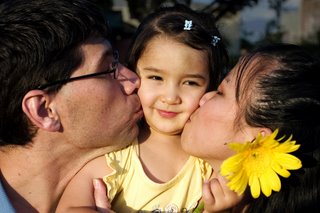“Oh sweetie, you’re so special.”
I found myself saying this to my 6-year-old daughter the other day and afterward, began to think about the implications of that statement.
This MSN Mental Health article warns us that the results of a 24-year-long survey of college students indicate a serious rise in a narcissistic approach to living.
“We need to stop endlessly repeating ‘You’re special’ and having children repeat that back,” said the study’s lead author, Professor Jean Twenge of San Diego State University. “Kids are self-centered enough already.” I’m not sure I agree with this statement, but I do think it’s important to consider how we praise children and the kind of feedback we give them.
The hallmarks of narcissism are:
- lack of empathy
- inability to cope with criticism
- favoring self over all others, to the detriment of personal and business relationships
- manipulative and deceitful behavior
- controlling and violent behavior
According to the survey, today’s college students are much more prone than their predecessors to answer yes to statements like these:
I think I am a special person.
If I ruled the world, it would be a better place.
I can live my life any way I want to.
When I look at data like this, I find it noteworthy that one can view such statements as either a sign of terrific confidence or of a sign that someone is on the verge of developing a Napoleon complex. If living life the way you want to means you’re going to go tend to injured dolphins in the Pacific Ocean, that sounds great to me. But if it means you want to conquer another country and rule them with a dictatorial hand…we may have a problem here. I think this dilemma calls for a re-examination of the phrase self-esteem.
What Is Healthy Self-Esteem?
Most experts agree that having healthy self-esteem includes being able to accurately assess yourself and your strengths and weaknesses. It does not mean that you think you are perfect, or better than anyone else. It means that we see ourselves as valuable contributors to our families and communities; we have something worthwhile to offer.
If children are spoiled or indulged, or alternately ignored or criticized, it becomes difficult for them to to have true humility, to make the effort of self-improvement, and to recognize the rights of others. Children are intrinsically valuable, simply for existing. While they absolutely should learn about the importance of making moral choices, their self-worth cannot be completely based on their behavior. Our love and approval should be unconditional, and when we are disappointed by their poor choices, our message should be clear: we disapprove of what you’ve done, but not of who you are.
The Importance of Unconditional Love
 It’s natural and normal for parents to view their children as miraculous, astonishing and wonderful little people. Infants and children must feel cherished and loved in order to develop normally, both physically and emotionally. In loving families, new babies elicit a reaction of absolute delight just by being themselves! While I recognize the hazard of heaping a child with meaningless praise, I am equally convinced of the hazard of not giving young children any recognition and appreciation.
It’s natural and normal for parents to view their children as miraculous, astonishing and wonderful little people. Infants and children must feel cherished and loved in order to develop normally, both physically and emotionally. In loving families, new babies elicit a reaction of absolute delight just by being themselves! While I recognize the hazard of heaping a child with meaningless praise, I am equally convinced of the hazard of not giving young children any recognition and appreciation.
In this life, we are all destined to run into both good and bad apples when we make forays into the world. We meet people who respect us and others who want to take advantage of us. But never again do we meet with a quality of acceptance quite as magnificent as the one we knew as children, if our parents loved us. I believe that parents and teachers who demonstrate clearly to children that they have inherent value simply because they exist, are doing the most important thing they can to protect children from being deceived and abused by the bad apples they will run into in adulthood.
A grown woman may refuse to accept an abusive boyfriend’s belittling image of herself. A grown man may stand up to a situation that is beneath his dignity in the workplace. All because, once upon a time, important adults told them they were valuable.
It Starts with Us
Maria Montessori taught that the child’s work was to attain a discernment between good and evil. The child’s cues come from us – the grownups. This means that our first work is to examine our own moral code and be mindful of the examples we are setting. Do you know what determines all of our values and behavior? Relationships. It is our relationships that shape us. The importance of having supportive adults in a child’s life simply cannot be overstated.
The best thing is that teachers and parents can do is to consistently love, care, protect, and encourage the children in their care. It’s okay for kids to know that they are special to the people who love them. If they are given unconditional love, moral guidance, and constructive feedback regarding their behavior, children will develop healthy self-esteem that leads to good choices and success further down the road.
